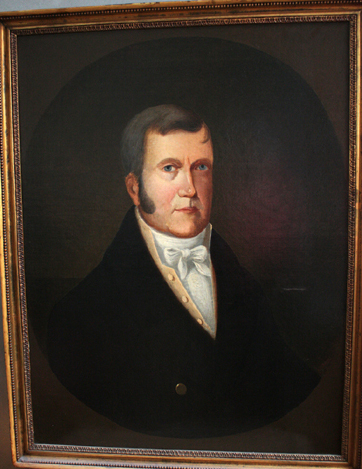
Although John Clark had a very common name, my four-times great-grandfather also had several secrets, some of which remain mysteries today.
The first mystery was, where and when he was born? According to family lore, John Clark was a butcher who had come to Canada from County Durham, England, but a search of the baptismal records of Durham for the late 1700s brought up more than a dozen John Clarks. Which one was he?
Fortunately, another descendant did some genealogy research about 100 years ago and he left a note in the family Bible: “John Clark, pork butcher, 9-6-1767.” I checked the parish records again, and there it was: John Clark, of Wingate Grange, was baptized at Kelloe parish church, County Durham, on 9 June, 1767. County Durham was later known for its coal mines, but the region was mostly farmland when John was born, and Wingate Grange was a farm.
John’s parents, Ralph Clark and Margaret Pearson, were married in nearby Kirk Merrington parish in 1746. Why the family moved to Kelloe, and whether Ralph was a small landowner or a tenant farmer, I do not know. John appears to have been the seventh of their nine children. Several years ago, my husband and I visited the city of Durham, where we walked the steep streets of old town and toured the ancient cathedral. We had to leave the city to find the churches and cemeteries where John Clark and his wife’s family members had been baptized, married and buried, so I arranged for retired genealogist Geoff Nicholson to drive us around. Not only did Geoff take us to all those out-of-the-way places without getting lost, he told us about the area’s history.
Our first stop was the old church of St. Giles parish, on a hill above the Wear River, where John and Mary Mitchinson (also spelled Mitcheson), of Lanchester, Durham, were married on 10 June, 1794. The Marriage Bonds and Allegations of their union revealed a surprising fact: John was a widower when he married Mary. According to the Bishop’s Transcripts for Kelloe, a John Robson Clerk had married Eleanor House in 1785. If this was my John, he would have been just 18 years old. I have so far been unable to learn anything about Eleanor, including where and when she died.

In 1795, Mary Mitchinson gave birth to the couple’s only daughter, Mary Ann Clark. Sometime between then and 1798, the family left for a new life in Canada.
But here’s the mystery: according to family stories, John Clark owned a freehold estate in Durham that was later sold by his grandson, Stanley Clark Bagg. I wondered whether this was just a myth, but I have found documents in Canada, including John Clark’s 1825 will and other notarial records dating from the 1840s, that prove John did own property in Durham.
But why did John leave England if he owned property there? And how did he acquire it? Was he a successful businessman who invested his profits in property? That is what he did in Montreal.
Did he inherit the property from his parents? That seems unlikely since his parents do not appear to have been wealthy, and he had an older brother, Robert, who would probably have inherited whatever there was. Or did John inherit from his first wife? Much more research is needed.
Photo credits: Portrait of John Clark, private collection. It may have been painted after his death from a miniature. The artist was Sir Martin Archer Shee RA, (1769-1850), a British portrait painter.
Photo of St. Giles parish church, Durham by Janice Hamilton
Research remarks: I found the record of John’s birth in Kelloe parish in the Northumberland and Durham Baptisms, on Findmypast.com.
The Bishops Transcripts were copies, made annually, of the original parish records. I found a record of the marriage of John Robson Clerk and Eleanor House in Kelloe parish in the Bishop Transcripts, on familysearch.org. John did not usually use his middle name, but he is remembered as John R. Clark on a plaque in the Bagg family mausoleum in Montreal.
Prior to most marriages in England, banns were read and people could express their opposition to the union. Couples could bypass this step by paying a fee for a marriage license.
A marriage allegation is a sworn statement in connection with the license application, in which the couple state there is no known reason for the marriage not to take place. The Durham Diocese, England, Calendar of Marriage Bonds and Allegations, 1494-1815, can be browsed on Ancestry, while familysearch.org has the records for the years 1692-1900. Both names and places are indexed.
John Clark’s will can be found in the records of notary Henry Griffin, #5989, 29 Aug. 1825, on microfilm at the Bibliotheque et Archives nationales du Quebec in Montreal.
In the future, I will write about John Clark’s life in Montreal.
